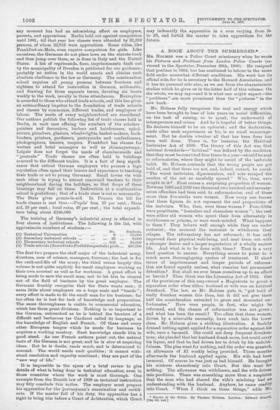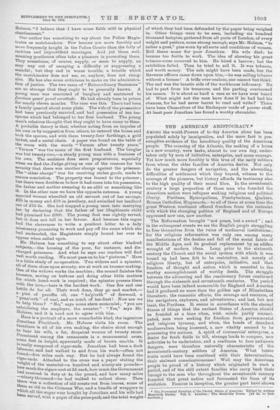A BOOK ABOUT THE SUBMERGED.*
MR. HOLMES was a Police Court missionary when he wrote his Pictures and Problems front London Police Courts (re- viewed in the Spectator, December 29th, 1900). He resigned that position in 1904, but has continued to labour in the same field under somewhat different conditions. His work has its official side, for be is secretary to the Howard Association, and it has its personal side also, as we see from the characteristic studies which he gives us in the latter half of this volume. On the whole, we may say—and it is what one might expect—the "problems" are more prominent than the "pictures" in the new book.
Mr. Holmes fully recognises the zeal and energy which have been brought to bear of late years on social difficulties, on the task of raising, so to speak, the underworld of intemperance and crime. And he is hopeful of better things. He declares himself to be an optimist ; and the .declaration, made after such experiences as his, is no small encourage- ment. But he doubts whether all that hate been done has been well done. There is, for instance, the Habitual Inebriates Act of 1898. The theory of this Act was that habitual drundards—" habitual" was defined by the condition that they must be convicted four times in a year—should be sent to reformatories, where they might be cured of the inebriate habit. Mr. Holmes contends that the wrong people are got hold of, and that these are not, and, indeed, cannot, be cured. "The worst inebriates, dipsomaniacs, and sots escaped the meshes of the net so carefully spread." Who, then, were caught in it P First comes a surprising proportion of women. Between 1898 and 1906 two thousand two hundred and seventy- seven offenders had been sent to reformatories, and of these more than five-sixths were women. Now every one knows that these figures do not represent the real proportiOns of the inebriate. Who, then, were these women P Four-fifths were prostitutes, " homeless and shameless women "; the rest were either old women who spent their lives alternately in workhouses or prisons, or were weak-minded. What happens to them 14 They behave well enough while they are under restraint; the moment the restraint is withdrawn they relapse. The reformatory has not reformed ; it has only improved their physical well-being, and sent them out with a stronger desire and a larger expectation of a wholly useless life. And what is to be done with them P That is a very hard question to answer. Everything seems to point to a much more thoroughgoing system of treatment. If short terms of imprisonment and longer periods of reforma- tion are found equally useless, what remains but permanent detention? But shall we ever brace ourselves up to an effort so heroic ? Then there was the Licensing Act of 1902. One of the provisions of this empowered a Magistrate to grant a separation order when either husband or wife was an habitual drunkard. The law, as Mr. Holmes puts it, "got hold of really drunken women this time, but it did not give them half the consideration extended to gross and demented un- fortunates." Here were people, in fact, who might be reformed, and the chance of reformation was not given ; and what has been the result? Too often that these women, driven by a miserable necessity, have sunk into the lower class. Mr. Holmes gives a striking illustration. A flashily dressed betting-agent applied for a separation order against his wife, once a barmaid. She could not deny frequent drunken• ness; she pleaded that her husband drank more, but could early his liquor, and that he had driven her to drink by his unfaith- fulness. The plea went for nothing, and the order was granted, an allowance of £1 weekly being provided. Three months afterwards the husband applied again. His wife had been immoraL Of course be was just as bad himself. He brought his mistress shamelessly into Court. But this went for nothing. The allowance was withdrawn, and the wife driven into perdition. There was something more than a suspicion that the man who had shared the wife's misdoing had an understanding with the husband. Anyhow, he came readily into Court. "When I think on these things," adds Din
• Known to the Police. By Thomas Holmes. Loudon : Edward Arnold. [iON. 6d. net.]
Holmes, "I believe that I have some faith still in physical obatitieement."
Our author has something to say about the Police Magis- trates as matchmakers. Few lessons are more forcibly and more frequently. taught in the Police Courts than the folly of reckless and improvident marriages. And yet these well- meaning gentlemen often take a pleasure in promoting them. They sometimes, of course, supply, or seem to supply, an easy way out of escaping a difficulty or suppressing a scandal ; but they end in worse trouble, a trouble which the matchmaker does not see, or, anyhow, does not recog- nise. He has also some criticisms to make on the administra- tion of justice. The two oases of "Extraordinary Sentences" are so strange that they ought to be generally known. A young man was convicted of burglary and, sentenced to fourteen years' penal servitude. He bad already been in prison for nearly eleven months. The case was this. There had been a family quarrel about some plate. The wife of the prosecutor had been previously married, and had possession of ten tea- spoons which had belonged to her first husband. The young man's relatives thought that they ought to have come to them. A probable theory is that, whether acting from an impulse of his own or by suggestion from others, he entered the house and took the spoons, and with them twenty-four farthings, a gold locket, and a metal chain. A paper was found on the table of the room with the words " Vernon after twenty years." " Vernon " was the name of the first husband. The burglar was but twenty-two,—a steady young man with a business of his own. The sentence does seem preposterous, especially when we find the Judge giving as one of the reasons for his severity that there was another charge against the prisoner. The " other charge" was for receiving stolen goods, made to ensure conviction. The property was traced to the prisoner ; but there were doubts as to how it had come into his possession, the father and mother swearing to an alibi or something like it In the other case we have the opposite extreme. A young married woman wheedled an old servant out of her savings, £70 in money and £10 in jewellery, and swindled her landlord cut of £10 5s. She had trapped a young man into marrying her by declaring that the father of her illegitimate child had promised her £300. The young fool was rightly served, but it does not tell in her favour. And because this rogue had the cleverness to write a penitent letter to a lady missionary promising to work and pay off the sums which she had embezzled, the Magistrate simply bound her over to appear when called upon. Mr. Holmes has something to say about other kindred ewhieeta,—the housing of the poor, for instance, and dis- charged prisoners. And what he says our readers will find Well worth reading. We must pass on to his " pictures." Here is a little study of co-operation. Two widows and a spinster, all of them olose upon seventy, are at work on trouser-making. One of the widows works the machine; the second finishes the trousers, sewing on buttons and doing other little matters for which hand-work is required ; the spinster presses them with the iron,--here is the hardest work. One fire and one kettle do for all. Their work done, they go and market,— a' pint of paraffin oil, one " ha'p'orth " of firewood, a Pean'orth " of coal, and as much of tea-dust ! Now are we to help them P "No," says some stern economist ; "you are subsidising the employer, the sweater." "Yes," says Mr. Holmes, and it is hard not to agree with him. Here is a portrait of a more remarkable kind, the ingenious Jonathan Pinchbeck. Mr. Holmes visits his room. The furniture is all of his own making, the chairs stout enough to bear his wife, a fat, dropsical woman of twenty stone. Prominent among the ornaments is a monumental cross, some feet in height, apparently made of brown marble. It is really composed of cigar-ends. Jonathan had been a dock 1,,ebourer, and bad walked to and from his work—often not
found five miles each way. But be had always found the cigar-ends. Attached to the cross was a paper stating the Weight of the material—a hundred and ninety-six pounds— !low much the cigars cost at 2d. each, how much the Government hadreceived in duty at 4s. the pound, and how many miles
'ninety thousand—he had walked to collect them. Then there was a collection of old cruets out from loaves, some of them as old as the Crimean War, and a bundle of wrappers in which all the sugar ever bought by Jonathan and his wife had Dean served, with a paper of the price paid, and the total weight of which they had been defrauded by the paper being weighed in. Other things were to be seen, including six hundred thousand hairpins, gathered from all parts of London, of every weight and pattern, some strong enough, says Mr. Holmes, "to tether a goat," pins worn by all sorts and conditions of women. Evil times came for poor Jonathan. His wife died ; be became too feeble to work. The idea of showing his great tobacco-cross occurred to him. He hired a barrow; but the exhibition failed. Then he tried to sell it. It was tobacco, and worth money. The sale might have been made, but the Revenue officers came down upon him,—he was selling tobacco without a license! A trifle over-zealous, one cannot but think. The end was the lunatic side of the workhouse infirmary. He had to part from his treasures, and the parting overturned his reason. It is about as hard a case as we have ever beard of. What might not the man have done if he had had his chances, for he had never learnt to read and write P There have been Chancellors of the Exchequer made of poorer stuff. At least poor Jonathan has found a worthy chronicler.



























































 Previous page
Previous page